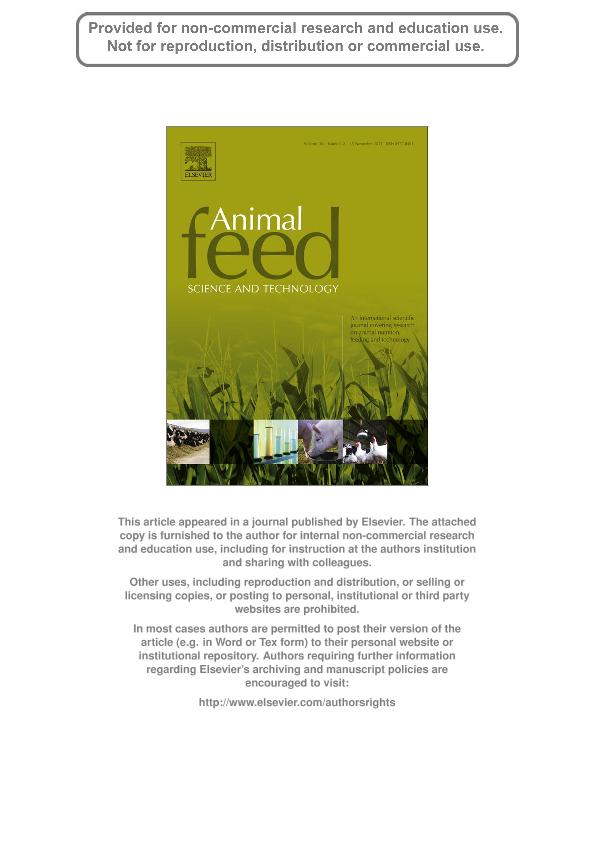Mostrar el registro sencillo del ítem
dc.contributor.author
Flores, Angela Jorgelina

dc.contributor.author
Garciarena, Alberto D.
dc.contributor.author
Hernández Vieyra, Juan M.
dc.contributor.author
Beauchemin, Karen A.
dc.contributor.author
Colombatto, Dario

dc.date.available
2017-10-06T20:57:04Z
dc.date.issued
2013-09
dc.identifier.citation
Flores, Angela Jorgelina; Garciarena, Alberto D.; Hernández Vieyra, Juan M.; Beauchemin, Karen A.; Colombatto, Dario; Effects of specific essential oil compounds on the ruminal environment, milk production and milk composition of lactating dairy cows at pasture; Elsevier Science; Animal Feed Science And Technology; 186; 1-2; 9-2013; 20-26
dc.identifier.issn
0377-8401
dc.identifier.uri
http://hdl.handle.net/11336/26194
dc.description.abstract
Sixty multiparous, lactating Holstein cows (57 ± 23.1 d in milk at the start of the experiment) were used in a completely randomized design to examine effects of adding incremental levels of dietary essential oil compounds (EO; 0, 200, 400 and 600 mg/d) on milk production and composition. Cows were allowed to graze on winter oats for 8 h/d with a daily herbage allowance of 15 kg dry matter (DM)/cow, and then received supplemental corn silage and sunflower meal in confinement for the remainder of the day. The EO were fed individually at milking times (0600 and 1600 h), mixed with 0.86 kg DM of dry rolled corn grain. In addition, 4 ruminally cannulated lactating Holstein cows in mid lactation were used in a 4×4 Latin Square design with 14 d periods to study effects of EO on ruminal fermentation characteristics and ruminal in sacco DM, crude protein (CP), and neutral detergent fiber (aNDF) degradability. Milk production, which ranged from 18.8 to 20.2 kg/d, and milk composition were not affected by EO. In general, ruminal fermentation characteristics were not affected by EO addition at any level, except for a 13% increase in butyrate concentrations with all EO levels compared to the control. Ruminal ammonia N concentration was high in all treatments (51.5 ± 5.75 mg/100 ml) and tended (P=0.09) to increase when 200 and 400 mg/d of EO were added. In addition, 200 mg/d of EO marginally decreased the potentially ruminally degradable fraction of the CP of the complete ration. Results using dairy cows in mid lactation that grazed 8 h/d on lush pasture showed limited effects of this EO complex on ruminal fermentation, milk production and milk composition.
dc.format
application/pdf
dc.language.iso
eng
dc.publisher
Elsevier Science

dc.rights
info:eu-repo/semantics/openAccess
dc.rights.uri
https://creativecommons.org/licenses/by-nc-nd/2.5/ar/
dc.subject
Dairy Cow
dc.subject
Essential Oil
dc.subject
Grazing
dc.subject
Digestion
dc.subject
Feed Additives
dc.subject.classification
Otras Producción Animal y Lechería

dc.subject.classification
Producción Animal y Lechería

dc.subject.classification
CIENCIAS AGRÍCOLAS

dc.title
Effects of specific essential oil compounds on the ruminal environment, milk production and milk composition of lactating dairy cows at pasture
dc.type
info:eu-repo/semantics/article
dc.type
info:ar-repo/semantics/artículo
dc.type
info:eu-repo/semantics/publishedVersion
dc.date.updated
2017-09-28T18:11:33Z
dc.journal.volume
186
dc.journal.number
1-2
dc.journal.pagination
20-26
dc.journal.pais
Países Bajos

dc.journal.ciudad
Amsterdam
dc.description.fil
Fil: Flores, Angela Jorgelina. Instituto Nacional de Tecnología Agropecuaria. Centro Regional Corrientes. Estación Experimental Agropecuaria Mercedes; Argentina
dc.description.fil
Fil: Garciarena, Alberto D.. Instituto Nacional de Tecnología Agropecuaria. Centro Regional Buenos Aires Sur. Estación Experimental Agropecuaria Balcarce; Argentina
dc.description.fil
Fil: Hernández Vieyra, Juan M.. Argent Export; Argentina
dc.description.fil
Fil: Beauchemin, Karen A.. Agriculture and Agri-Food Canada; Canadá
dc.description.fil
Fil: Colombatto, Dario. Universidad de Buenos Aires. Facultad de Agronomia. Departamento de Producción Animal; Argentina. Consejo Nacional de Investigaciones Científicas y Técnicas; Argentina
dc.journal.title
Animal Feed Science And Technology

dc.relation.alternativeid
info:eu-repo/semantics/altIdentifier/doi/http://dx.doi.org/10.1016/j.anifeedsci.2013.09.001
dc.relation.alternativeid
info:eu-repo/semantics/altIdentifier/url/http://www.sciencedirect.com/science/article/pii/S037784011300237X
Archivos asociados
